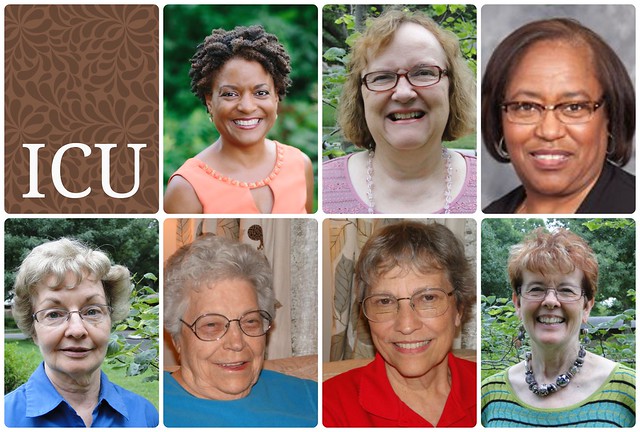Top row: Deidra, Jan, Janice; Bottom row: Lori, Marge, Martha, Susan
It’s been two summers since the women’s book club from our church went together to see “The Help.” Out of that experience, we began having conversations about race, especially as it relates to our congregation. The congregation has changed drastically in the eight years since H and I moved here for H to serve as the congregation’s senior pastor.
H has been a minister for thirty years. This is his third church, and it’s no secret to anyone that this congregation has been the most challenging. Within a year after our arrival, the majority of the people who had enthusiastically extended the call to H to serve had left the church in anger, disappointment, and/or pain.
Even today, it’s difficult to put a finger on the reason things fell apart. Surely, we don’t point fingers, because it takes two to tango.
During the process of interviewing for this role, H felt certain the congregation wanted to invest their time, energy, and resources in a ministry that would serve the downtown community surrounding the church building. Research of this geographic area reveals a community that includes low- to middle-income workers; single-parent families with a mom raising children on her own; diverse languages, races, and cultures; an active LBGTQ community; and a drug subculture that includes meth as the substance of choice.
H knew it wasn’t going to be easy, but he felt up for the challenge.
Eight years ago, the congregation didn’t look very much like the community in which it worshipped. Generally speaking, the congregation was white, English-speaking, middle- to upper-class, married with the requisite 2.5 children, and most of us drove in from the suburbs each week.
In any relationship, it takes time to figure out the give and take, but I’m sure much of the way we approached those first years of ministry felt to the congregation as if they’d unleashed the proverbial bull in a china shop. On our side, we felt as if we could never connect. We all said and did terrible things. People in the congregation left. H and I tried to leave. We both became depressed, and I was prescribed an anti-depressant which helped me keep my head above water.
We will never know for sure, but it’s difficult to look back on those years without asking ourselves if any of the turmoil had to do with the fact that H and I and our family are black. And that’s not to say everything that happened was a reaction to our race, or an example of racism. A wise woman once told H whatever you take into the woods, you’ll find in the woods. In other words, if we came into the situation with preconceived notions about black church/white church and how white people should respond to us because we are black and because H is their pastor, we were likely to perceive what went down through those lenses. On the other hand, if the congregation also entered the situation with preconceived notions about what it would be like to have a black pastor in a white congregation and things didn’t unfold quite the way they anticipated, the congregation was likely to respond in a way that reflected that preconception.
Again, that’s not to say everything that happened was racially motivated. The bottom line is that churches are filled with people and people have baggage. Even in the best situations.
So, after our women’s group saw “The Help” and realized we didn’t really know too much about stories outside our own experience, we decided to do something about that. We call our group the ICU. A few weeks ago, I wrote here that I’d introduce you to these women and share a bit about what we’ve learned together. I asked the women four sets of questions, and over the next few days, I’ll share their responses with you. I’ll also share my own. As you’ll see, even our little group has a variety of opinions and experiences. If you take us at face value, you’d assume the whole thing gets dicey from time to time. I don’t think we’ve seen that, yet. Mainly because we hold true to the encouragement in I Corinthians that love hopes the best. We don’t always agree, that’s for sure. Except for this: we agree to stay at the table and to see what the end will be.
Here are the questions I’ve asked my ICU friends. You might want to answer a few of these yourself.
- What was your experience with race when you were growing up? What did your family teach you about people who were of a different race? What did your church teach? Your friends? Your school?
- From your perspective, can you tell the story of how the congregation has changed (racially, ethnically, culturally) over the past eight years? What does an African-American pastor bring to the congregation that might be unique? What things were easy to adjust to? What things have been more difficult?
- What is the benefit of the ICU group? What have you learned about race as a result of being part of this group? What have you learned about yourself? What has surprised you the most, with regard to what you’ve learned about yourself?
- Can you tell the story of a turning point in your thoughts about race and the church? What about race and life in America?
